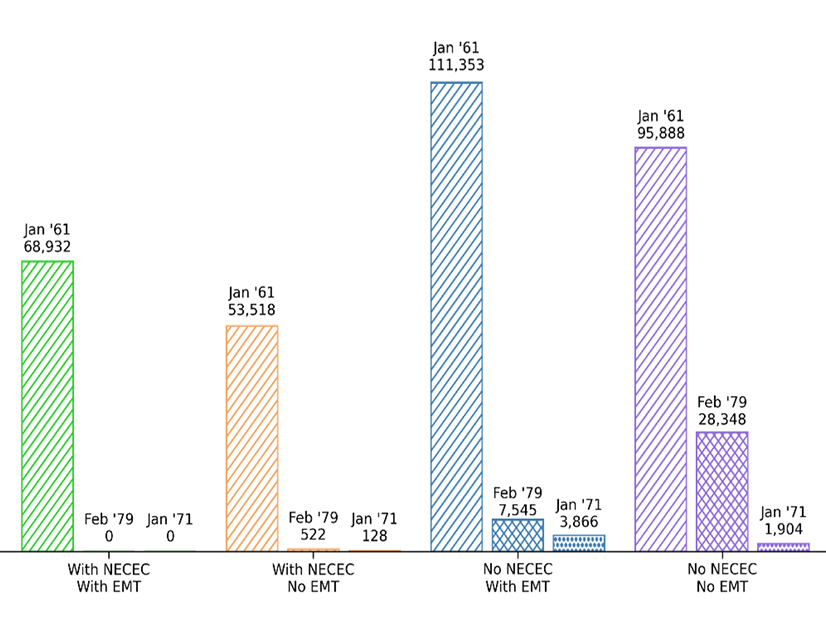
There is little risk of energy shortfall in the summer of 2032, ISO-NE told the NEPOOL Reliability Committee (RC) on Tuesday, building upon the RTO’s previously released 2032 winter results that gave mixed signals on the system’s reliability.
ISO-NE told the RC the shortfall risk for the summer of 2032 appears to be similar to that of summer 2027. (See No Shortfall Anticipated for Summer of 2027, ISO-NE Says.)
“No energy shortfall was observed in any of the summer 2032 events; only one hour of 30-minute reserve shortfall was observed in one July 13, 1979, case and in one July 26, 1984, case,” Stephen George of ISO-NE said.
These results are part of ISO-NE’s ongoing “Operational Impacts of Extreme Weather Events” study, which the RTO developed in conjunction with the Electric Power Research Institute.
ISO-NE’s baseline winter 2032 analyses projected worst-case energy shortfall risk to decrease in 2032 compared to 2027 in most scenarios. However, a sensitivity analysis — which considered an additional range of factors — showed increasing risks for 2032 compared to 2027.
The baseline analysis indicated winter shortfall risks significantly decreased with the presence of the New England Clean Energy Connect (NECEC) transmission line, while the Everett Marine Terminal actually increased shortfall risk in most of the scenarios modeled. ISO-NE said it expects the 1,200-MW NECEC line to be in service by 2032, while the future of Everett remains in limbo. (See Narrow Set of Options for Retaining Everett LNG Terminal.)
“In terms of magnitude and probability, baseline studies of 2032 winter events indicate an energy shortfall risk profile similar to that of the 2027 winter event studies,” ISO-NE said in August about the 2032 winter modeling.
However, the RTO noted that the “sensitivity analysis of 2032 worst-case scenarios indicate an increasing energy shortfall risk profile between 2027 and 2032,” adding that the increased risk “is particularly observable with the 2023 CELT (Capacity, Energy, Loads, and Transmission) load forecast.”
The 2023 CELT forecast increased the projected electricity demand for the 2031/2032 winter by about 10% compared to the 2022 CELT projection. (See ISO-NE Increases Peak Load Forecasts.) The baseline analyses were run using the 2022 CELT data.
The winter 2032 sensitivity analysis used the worst-case weather event modeled in the baseline analysis, while varying the levels of resource retirements, electricity demand, imports, stored fuel inventories and forced outages. ISO-NE told the RC that sensitivity analysis results for the summer of 2032 will be shared at a future meeting.
These reliability findings come as ISO-NE grapples with increasing levels of variable renewable generation coupled with a massive expected increase in electricity demand stemming from electrification. ISO-NE expects the regional grid to transition from a summer peak to a winter peak at some point in the coming decades, in part because of heating electrification.
EMT, which is the only LNG import terminal in New England, is propped up by the expensive Mystic Agreement, which will expire after this winter. ISO-NE’s quantitative analyses have not shown that the terminal is necessary for grid reliability, but the RTO has maintained the facility may be needed in the future in the face of rising winter demand and reliability concerns.
“I think it would be extremely unwise were we to let that facility go until we know where we are with regard to these variables,” ISO-NE CEO Gordon van Welie said at a FERC forum on winter reliability in June. (See NE Stakeholders Debate Future of Everett at FERC Winter Gas-Elec Forum.)
ISO-NE is conducting another round of sensitivity analysis for the winter of 2032, which will consider a range of factors and assumptions based on feedback from NEPOOL stakeholders. These added sensitivities will include varying levels of renewable generation, battery storage, behind-the-meter solar, demand response, imports, and gas, oil and nuclear resource retirements.
The RTO will discuss the results of this additional sensitivity analysis at the November RC meeting.



